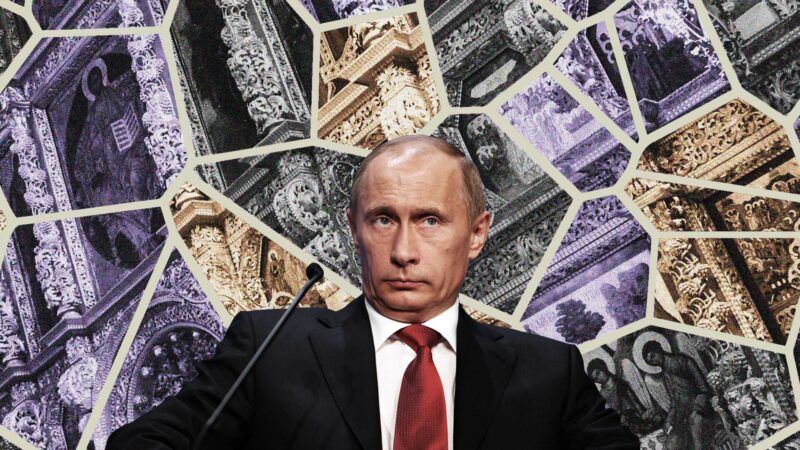No, Putin Isn't a Defender of 'Christian Values'
The country is one of the most egregious violators of religious liberty on the planet.

Russia's invasion of Ukraine has pitted much of the world into two teams, as war tends to do. The prevailing sentiment in the West appears to be pro-Ukraine. But among certain corners of the chattering classes, there's somewhat of a third team: one that isn't anti-Ukraine, per se, but also isn't anti-Russia. There is one foe, and it is America.
Its loudest adherents, ironically, are arguably U.S. nationalists—who to varying degrees admire Russian President Vladimir Putin's attempt at cultivating what they say is a more moral nation. "I actually support Putin's right to protect his people and always put his people first but also protect their Christian values," said Lauren Witzke, the Delaware GOP candidate for U.S. Senate in 2020. "I identify more with…Putin's Christian values than I do with Joe Biden's."
Though Witzke took the fringiest route, she is not alone in her overall approach. Steve Bannon, once an adviser to former President Donald Trump, noted approvingly on his podcast this week that at least "Putin ain't woke." Fox News host Tucker Carlson similarly admonished his audience: "It might be worth asking yourself…what is this really about? Why do I hate Putin so much?" he probed as he pushed back on the idea that the U.S. should intervene. "Is he teaching my children to embrace racial discrimination? Is he making fentanyl? Is he trying to snuff out Christianity?" (The monologue was later recycled by RT, Russia's government-controlled television network.)
It may be true that Putin isn't "making fentanyl." But to defend an isolationist position, one need not make light of the Russian president's moral atrocities—which have less to do with critical race theory and more to do with allegedly jailing and murdering dissidents.
Perhaps most ironic about Carlson's last question—and also per Witzke's comments—is that Putin, while a self-avowed adherent to Russian Orthodoxy, has been no friend to religious expression. In 2016, he passed a law criminalizing evangelical efforts outside of church walls—a measure that hamstrings religious life in public, in the home, and online, and thus targets many Christians for displays of faith. Those displays don't have to be overt: In 2019, a Baptist pastor was charged with illegal missionary activity for having the audacity to lead a Baptist worship service, and two members of the same sect found themselves in hot water after handing out religious literature at a bus stop. Jehovah's Witnesses are often at the center of such prosecutions as well and can face up to 10 years in prison.
The restrictions also likely impact the Orthodox community, as the government requires that anyone sharing a faith have a permit to do so and constrain those efforts to religious sites. In 2017, a year after the law's passage, Russia earned an unenviable distinction on the U.S. Commission on International Religious Freedom's list of countries most hostile to the expression of faith. As of last year, it still sits atop that list, along with Syria, India, and Vietnam—places that perpetuate "systematic, ongoing, and egregious" violations of religious liberty.
Conservative expressions of affection for Putin's supposed moral clarity are perhaps louder than usual. That doesn't mean they're new. "While privacy and freedom of thought, religion and speech are cherished rights, to equate traditional marriage and same-sex marriage is to equate good with evil," wrote former White House Communications Director Pat Buchanan in 2013, as he approvingly summarized Putin's opposition to the latter. "No moral confusion here, this is moral clarity."
But once again, Buchanan et. al need not align themselves with a murderous despot in order to take a principled stand for traditional marriage—particularly when considering that the Russian president's positioning may be rooted more in strategy than in faith. "Putin is seeking to tighten his grip on Ukraine and Belarus, as well as expand Russian influence further into Eastern and Central Europe," wrote Alexis Mrachek and Shane McCrum for the conservative Heritage Foundation in 2019. That feels a bit prophetic now: "He will undoubtedly continue to promote Orthodoxy in the process. This is simply an attempt to seduce former Soviet republics back under the sway of Russia." The Soviet Union of Putin's younger days was staunchly atheistic and used secularism as a tool to secure state worship. That ultimately failed. In some sense, Putin has subverted the approach to religion—leaning heavily on it as opposed to eschewing it—to arrive at the same end goal: state worship.
"The reality is that Russia is not the most religious nation in the world as far as…American evangelicals would recognize," says David French, a senior editor at The Dispatch who writes extensively on religion and U.S. conservatism. "I think it's much more a 'the enemy of an enemy is my friend.'…[Putin's] opposition to some of the international forces that some folks on the right in the United States despise the most creates a dynamic where there's a strange new respect for Putin, or sort of perceived understanding of Putin, or a perception that Putin can represent a welcome rebuke to an international order that they dislike." The things they take issue with may range from the United Nations to pronouns in bio.
In that regard, Putin has been waging a different war for years—a cultural one, where he has strategically placed himself at the front of the battlefield and succeeded in wooing some high-profile figures on the American right. That's not because the Christian values he espouses are necessarily important to him; I doubt many religious adherents would describe killing and poisoning critics as fruits of the Spirit. He's tried to obscure those cruelties by erecting himself as a moral bulwark against deviance. It's a tall order—and yet, somehow, in certain corners, he's succeeded.


Show Comments (151)